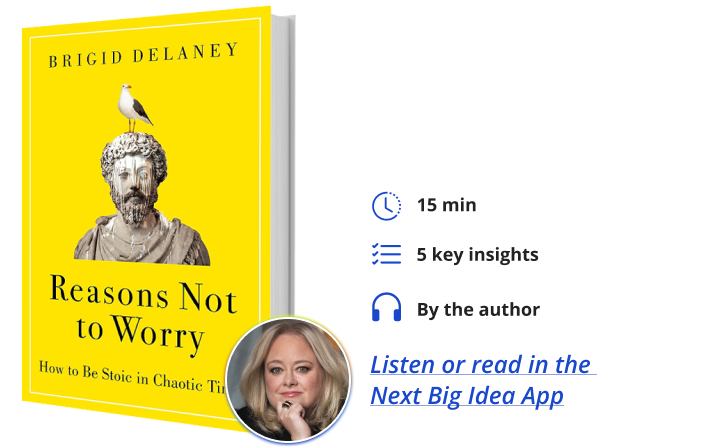Brigid Delaney is a journalist and political speechwriter for Australia’s minister for finance and minister for women. For many years she wrote the popular weekly column “Brigid Delaney’s Diary” for The Guardian. She co-created the Netflix series Wellmania, based on her last book, and cofounded the anti–death penalty movement Mercy Campaign.
Below, Brigid shares 5 key insights from her new book, Reasons Not to Worry: How to Be Stoic in Chaotic Times. Listen to the audio version—read by Brigid herself—in the Next Big Idea App.

1. The few things within your control are basically your actions, reactions, your character, and how you treat other people.
I started getting interested in stoicism around 2018 when I wrote a piece for The Guardian trying out a thing called Stoic Week. I didn’t take it too seriously. Then I realized that if I did actually apply stoicism, I might get some results. So, the following year, I did Stoic Week again, and this time really leaned into a lot of the texts.
Many of the texts that survive in Stoicism are the Roman Stoics, like Epictetus and Marcus Aurelius, author of the famous book Meditations, and Seneca, who was a brilliant playwright, statesman, and advisor to Nero.
While really getting into stoicism, I had a friend with whom I would take long walks and talk about what was going on in our lives. Since this friend was also exploring stoicism, we would see if we could apply it to what was happening for us at the time. I applied for a pay rise, which I didn’t get, and was furious. I said to my friend, “I’m going to quit. This is terrible, I deserve more money.” And he said, “Well, let’s apply stoicism to this.”
The Stoics believe that there are only a few things within your control and getting a pay rise isn’t one of them. The few things within your control are basically your actions and your reactions, your character, and how you treat other people, and all else is either only in your partial control or not in your control at all. As my boss was awarding the pay rise, I didn’t have control over whether I would get it, but I did have control as to whether I could do the best work possible to try and encourage them to give me a pay rise. Stoicism was able to settle me down in that example. It was able to make me realize that I couldn’t control someone else’s actions around my pay. I could leave and try and find another job, I could try and persuade my boss, but actually getting a pay rise in that circumstance was not within my control.
“There are many reasons not to worry about most things, so why should we spend our short time on Earth worrying?”
Stoicism, when applied in those situations, basically stops you from worrying and stressing about things you can’t control. That is one of the real joys of applying stoicism. It allows you to say, “Ok, I can’t control this. I’m just going to move on to the next thing, the next problem, the next bit of life that I’m grappling with.” There are many reasons not to worry about most things, so why should we spend our short time on Earth worrying?
Anyway, 2019 became 2020, and then of course came the pandemic. My origin country of Australia was affected as each country was affected in different ways, but Australia didn’t have much of the virus around for quite a while because it shut its borders. The government issued severe lockdowns and stay-at-home orders, which meant that once again, I was relying on Stoicism to get me through a period of time where I didn’t feel there was much in my control.
2. Stoicism, defined.
What is Stoicism? It is an ancient philosophy that started in Athens around 350 BCE and continued into the Christian era. This philosophy sort of petered out with the rise of Christianity, but it has enjoyed a resurgence in recent years, as there are a lot of Silicon Valley bros and others who have embraced this philosophy.
There are not as many female writers of stoicism, so it could be considered a genderless philosophy in many ways. It’s certainly helped me as a woman, and I don’t think the philosophy itself is for men only, or particularly masculine. It can be applied to anyone with a rational brain or mind, as the Stoics would say.
3. The main tenet or cornerstone of Stoicism is called the control test.
Work out what is in your control. This test is found in a text called the Enchiridion, which is based on a series of lectures by Epictetus, a famous Roman Stoic, who used to be a slave and then was freed and taught stoicism. His sense of the control test comes from a place of having no agency for a large part of his life. He could, however, control his character and that is what a lot of his writings emphasize.
In Epictetus’ handbook, which was published in 125 CE, he writes, Within our power are opinion, motivation, desire, aversion, and in a word, whatever is our own doing. Not within our power are our body, our property, reputation, office, and in a word, what is not of our own doing. Essentially, our field of control consists of our actions and reactions, our desires, our character, and how we treat others. The rest, including our bodies, the actions of others, our reputation and our fortunes, personal and financial, are out of our control.
There are of course a few contentious things with this, like the question of whether desire is really within our control. Many of us have felt that at some point desire has felt completely out of control. Things like hormones, the unconscious, trauma, and patterns we inherit ancestrally are all things that hadn’t necessarily been studied around the time of Stoicism, which is why they are not mentioned in stoic texts.
Our characters, however, are definitely within our control. We do have agency to stop, think, act differently, react differently, slow things down. Many Stoic texts, one in particular by Seneca, talk about how you can control things like anger, for example.
4. You don’t need to judge everything.
We make judgments really quickly, often without adequate information, and sometimes when no judgment is needed at all. So much of what we label good or bad is actually neutral. But our judgments are powerful and they dictate to a large extent how we respond.
An example is applying for a rental property that I really want. I have my heart set on it, even have it furnished it in my brain, and then I miss out on it. I tell myself, “This is bad. This is a bad situation.” I react, get upset, and lose my tranquility. But is it actually bad if the following week a much better place comes on the market and I’m successful in getting that? No. So, the thing that we thought was bad actually works out for us.
“So much of what we label good or bad is actually neutral.”
The Stoics were skilled at stepping back. Marcus Aurelius called it the view from above. Rather than getting caught up in the emotion of a rejection or not getting our own way, we step back, we take a longer view. When we take that longer view, we see that a lot of things that did upset us in the past actually weren’t the end of the world, they were neutral events that we put our own lens on.
The Stoics were also really into tranquility. They tried to keep a baseline calm state. They called it ataraxia in all of the readings. A way of having this ataraxia was to refrain from making constant judgements.
5. Maintain preferred indifference.
Money, health, and reputation are out of our control. It’s pretty scary for a lot of people to think that you could end up bankrupt, you probably will get ill, and you’re definitely going to die. You can try your hardest to have a good reputation, but people can spread rumors or get things wrong. All these things are out of our control.
Once again, if we want to preserve our tranquility, recognize that those things are out of our control. Do not get too down or unhappy if you lose them because you most certainly will lose them at some point in your life. Just try to keep that tranquil state.
As per the control test, money, health, and reputation are all essentially outside our control. If we can cultivate indifference to them, we’re less likely to become upset and waste energy trying to control them. Without any fault of your own, you could lose your reputation, your job, your money, your house, maybe your marriage. You’re certainly going to lose your looks as you age. If you live long enough, you might lose mobility, cognitive ability and other aspects of your health. Accidents and illnesses happen all the time too, and are also outside your control.
The idea of preferred indifference warns against suffering twice. You can’t help but suffer once. If you get ill or you get injured, that’s out of your control. You can’t do much about it, you’ve just got to wear it. But you can stop the second suffering that comes from that, which is the anger or anxiety that comes from being sick or injured.
They say illness or injury can happen to anyone, so there’s no reason why it shouldn’t happen to you. And death eventually comes for us all. In order to avoid being too pained by these accruing losses, it’s better to practice indifference to what you have in the first place.
To listen to the audio version read by author Brigid Delaney, download the Next Big Idea App today:































